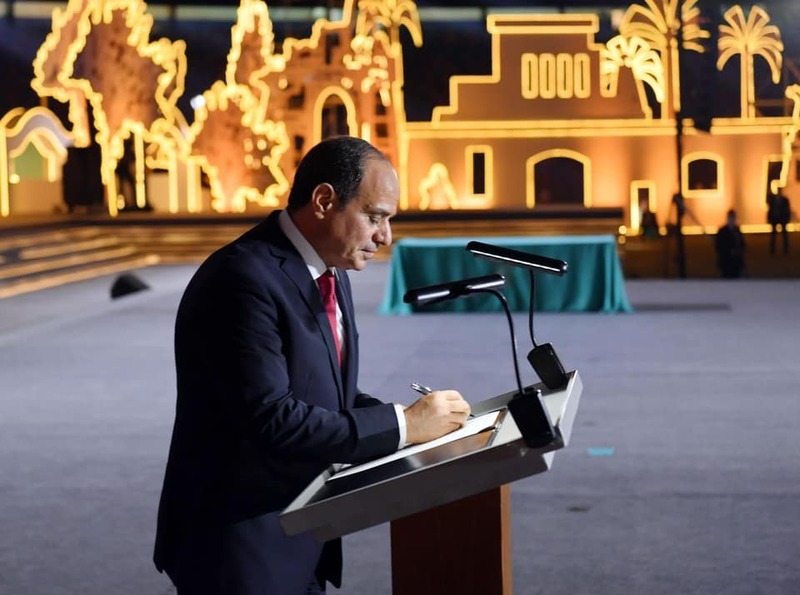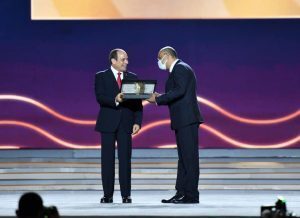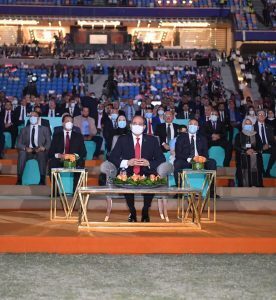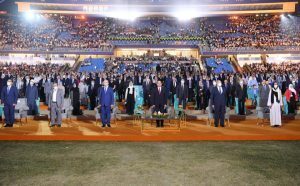
Opening concert of Annual Meeting 2025 in Davos-Klosters to address glacier melt in Antractica
The opening concert of the Annual Meeting 2025 in Davos-Klosters will address the pressing issues ...

Decent Life – “Hayat Kareema” – initiative which first mooted at one of the youth forums – is now moving ahead to be an icon of the new republic of Egypt. It is deemed as a mega national project serving the 17 United Nations Sustainable Development Goals.
Decent Life initiative is an idea proposed by ambitious youths to the president during one of the youth forums.
Believing in this idea and its viability, the president gave directives to implement the overture which would mobilize the efforts of the government and civil society to achieve development.
The main objective of the initiative is to improve the quality of life in villages through providing them with basic services, topped by clean water, electricity, sanitation, and natural gas in addition to promoting health and educational services.
The initiative also included establishing governmental service complexes to facilitate offering services to citizens. Moreover, the initiative worked on paving streets in villages and renovating the canals used in irrigating lands.
The initiative also took into consideration the importance of securing decent housing for people living in rural areas.
The initiative also played a role in spreading culture through developing libraries and adopting cultural programs. The initiative also contributed to supporting orphans and poor girls.
January 2 in 2019 represents a remarkable day in the lives of millions of Egyptians as President Abdel Fattah El Sisi gave the go ahead of the “Decent Life” initiative to improve the living standards in thousands of Egyptian villages. Then, the initiative was expanded to become a national project of the 21st century.
Undoubtedly, the government is interested in rendering the initiative successful so that people would enjoy a better life.
Moreover, the president has directed that the initiative will be carried out by Egyptian cadres and Egypt-made materials, thus creating hundreds of thousands of jobs and boosting economy.
Now after two years, specifically on July 15, 2021, “Decent Life” Foundation held a grand ceremony to mark the launch of the presidential initiative “Decent Life” for developing Egypt’s countryside after the preliminary stage showed how far the initiative is vital for realizing development in Egypt and attaining the Sustainable Development Goals.
President Sisi attended the ceremony – which was held at the Cairo Stadium – alongside Prime Minister Moustafa Madbouli and a number of ministers, public figures, businessmen and media men. Also, thousands of citizens representing all Egyptian governorates were present.
During the ceremony, the idea of “Decent Life” initiative was reviewed with special focus on its story of success. The dimensions and objectives of the initiative were expounded alongside the achievements realized on the ground since its launch until now.
During the ceremony, Treasurer of the Decent Life Foundation Omar Behnasi explained how far the president backs youths to realize development in Egypt’s countryside and improve the lives of people living in villages and rural areas.
Ohoud Wafi, Vice-Chairperson of the Board of Trustees of the Decent Life Foundation, reviewed the outcome of the national project for developing the Egyptian countryside under Decent Life initiative.
She explained how efforts were rallied up to turn the dream of developing Egyptian villages into reality.
Aya Omar El Qamari, chairperson of the Board of Trustees of the Decent Life Foundation, highlighted the companies and bodies that contributed to funding the project in order to help the state overcome the challenges besetting it.
The Decent Life Foundation has opened the door for all youths nationwide to engage in voluntary work under the initiative. The number of volunteers exceeded 21,000 in one year.
The national project for developing Egypt’s countryside under Decent Life initiative received donations at about EGP 5.5 billion.
During the ceremony, President Sisi said “We went deep into problems and the piling economic crises over decades through the economic reform program. The Egyptian people were the heroes who bore the impact of the reforms on their daily life to secure a better future for the coming generations.”
The president said “the mega national projects represented an icon of the Egyptians’ will to build their nation,” referring to securing decent social houses for youths, developing dangerous and slum areas, upgrading the national roads network and expanding the agricultural lands.
Sisi said “Today, the great national project for developing the Egyptian countryside under ‘Decent Life’ is meant to raise standards of living in 4,000 villages in the coming three years. We seek realizing sustainable development and improving the quality of life of 58 million Egyptians within the coming three years at a total budget of about EGP 700 billion or more.”
The president added “This ambitious project – in my point of view – marks the launch of a new Egyptian republic which is based on the concept of modern democratic state enjoying all capabilities at the military, economic, political, and social levels. This modern state heeds the concepts of citizenship and accepting the other. It also seeks to achieve peace, stability and development.”
The president added that Decent Life initiative is meant to invest in the Egyptian people at all levels.
Meanwhile, Prime Minister Moustafa Madbouli said “Decent Life is the biggest project to be implemented by a country in the modern era. It is an icon of a new republic.”
“The Egyptian state has implemented over the past seven years several national projects at a total cost of over 6 trillion pounds… This has contributed to promoting the state’s capabilities to achieve sustainable development in the Egyptian countryside,” the premier said.
He said “the Suez Canal was the project of the 19th century, the High Dam was the project of the 20th century and Decent Life is the project of the 21st century.”
The initiative aims at developing more than 4,500 villages nationwide. This is the first time for a sole national project to aim serving about 58 percent of Egypt’s population in 2021.
For the first time, the project is engaged into all aspects of life at the economic, social and urban levels.
The 100 percent Egyptian project is being implemented at more than EGP 700 billion investments.
Indices were launched to assess the quality of life in Egyptian villages, especially with regard to improving water, sanitation, roads services as well as promoting education.
Under the initiative, villages will enjoy unprecedented services, like extending natural gas and fiber optics.
The initiative embodies the implementation of the 17 United Nations Sustainable Development Goals. Therefore, it was included in the United Nations SDG Good Practices.
The first preliminary stage: It started when the president gave the green light to the initiative in the beginning of 2019. According to the results of the preliminary stage, 375 villages were upgraded in line with directives of President Sisi to achieve sustainable development nationwide.
The Housing Ministry started with the development of the most needy villages amid plans to renovate 1,413 villages at an average cost of EGP 260 billion.
The implementation of the initiative depended on scientific methods and data base. Nine standards were set to determine the poverty rate of villages in order to select the most needy villages and people.
The initiative focused on improving four basic services; sanitation, lining canals, promoting agricultural complexes, roads renovation, in addition to extending natural gas, electricity as well as postal and communication services.
1- Sanitation projects:
Prime Minister Moustafa Madbouli said 100 percent of the Egyptian countryside will enjoy sanitation services and have clean water and electricity.
The first stage – which targets 1,143 villages – aimed at establishing 130 waste water treatment stations at a capacity of 2 million cubic meters daily.
2- Potable water projects:
Under the first stage, the initiative aimed at establishing 51 potable water treatment plants in addition to 421 small water purification stations to improve the quality of water. The projects support about 1,051 villages.
3- Natural gas projects:
The initiative aimed at extending natural gas to 4 million housing units in 1,337 villages in the first stage. The project will facilitate supplying energy to people, cutting harmful emissions, expanding the use of clean energy, encouraging investment opportunities in building factories and commercial plants, and expanding the establishment of natural gas fuel stations.
4- Electricity projects:
Under the first stage, Decent Life initiative aimed at installing 4.5 million pre-paid electricity meters, power transmitters, electricity interconnectors and control tools.
5- Renovating and lining of canals:
The first stage involved implementing 232 projects in order to renovate and line 2.5-thousand kilometer canals in villages.
6 – Agricultural projects:
The first stage targeted establishing agricultural complexes so that farmers would for the first time easily obtain all agricultural services. Also, the number of milk collection centers was expanded, while maintaining quality of milk.
7 – Governmental services complexes:
All new ministries premises in the New Administrative Capital are being set to be smart and modern in line with directives of President Sisi.
8 – Roads and bridges:
About 14.5 thousand-kilometer-long roads were developed in villages. The state also aimed at establishing 617 bridges.
9- Nile ferries and anchors:
Over 80 ferries were upgraded in the first stage in tandem with the Suez Canal Authority, private sector and people.
Secondly: Investing in Egyptian people:
1- Education:
The initiative aimed at modernizing the educational infrastructure. It targeted establishing 14,000 primary stage classes, developing educational curricula for the first time and setting up 4,000 smart classes.
2- Health:
The first stage aimed at establishing 24 hospitals, 1,374 health units, 398 ambulance points, 52 family development center in addition to launching 1,000 medical convoys.
3 – Youth and sports:
The initiative included the implementation of a giant project for establishing and developing 645 youth centers in the countryside.
4- Culture and awareness:
The Culture Ministry has also implemented the “book kiosk” project under the initiative with an aim to spread knowledge, create jobs and present mobile theatrical shows for free.
Thirdly: Social activities:
The initiative included securing decent housing, eradicating illiteracy, supporting handicapped people in addition to launching medical and veterinary convoys and awareness campaigns on the importance of practicing sports.
The first stage included securing 120,000 decent houses at 72 billion pounds in 20 governorates.
The initiative aimed at establishing and developing 3,000 nurseries in addition to setting up centers for training productive families and offering family advises. It also targeted establishing about 1,200 social schools and 5400 adult literacy classes.
The initiative aimed at establishing 20 centers for handicapped people in partnership with the Health Ministry to offer services to them, including assessing their IQ and offering psychological support and rehabilitation services.
Fourthly, Economic development and jobs:
The initiative aimed at establishing industrial complexes and getting villagers to engage in building their houses, recycling waste and achieving development in the agricultural and fish scores. This is meant to offer training for villagers, secure permanent and temporary job opportunities and realize financial inclusion.
The initiative’s first stage aimed at injecting EGP 1.4 billion for funding micro, small and medium sized enterprises.
2- Craft complexes:
The initiative aimed at establishing 333 craft complexes in villages.
The initiative aimed at training 1600 youths – 150 trainees from each village – within the framework of spreading the culture of digital economy and qualifying students and graduates to engage in free businesses.
The initiative aimed at expanding e-payment machines, installing 1,000 ATM machines inside postal offices and developing the Agriculture Banks branches. It also aimed at opening economic banking accounts for craftsmen and small businesses in addition to expanding the issuance of Meeza pre-paid cards.
The initiative is taking great strides to realize tangible change in line with Egypt Vision 2030 and the United Nations Sustainable Development Goals.



The opening concert of the Annual Meeting 2025 in Davos-Klosters will address the pressing issues ...
Juhayna Food Industries proudly announced that its agricultural arm, El Enmaa for Agricultural Development, has ...
The United Nations Environment Program (UNEP) and several partners launched a pilot project to build ...


اترك تعليقا